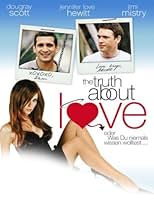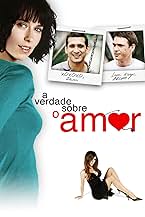Watching TRUTH ABOUT LOVE (is this a double entendre about the star?) is like plugging in white noise or manufactured water sounds to help you sleep - you put it in the DVD slot because there is nothing else left on the store shelves and you are in need of distraction after a hectic day. And it works for that for that purpose: being a British romantic comedy it is a bit more.
The story is a rather simple one about a wife Alice (Jennifer Love Hewitt) married to an increasingly distant husband Sam (Jimi Mistry) who has put their love life on hold due to the burdens of his busy law practice. His partner Archie (Dougray Scott) is fond of both Sam and Alice, but has a longtime attraction to Alice that goes beyond friendship. Alice pals with her sister Felicity (Kate Miles), a free love advocate, who encourages Alice to have affairs. On Valentine's Day, after a drinking binge with her sister, Alice mails a card to Sam signed 'Anonymous' as a test to see if Sam responds, testing his fidelity. At the same time Archie mails a radish seed packet to Alice on which he has inscribed a suggestive love not. Both have ex post facto regrets. Sam in fact is spending time with a lover Katya (Branka Katic) and is indeed cheating on Alice. Alice arranges assignations with Sam via email and phone calls and plans to meet Sam in disguise as 'Anonymous' to test his fidelity. The entire cast of characters gets caught up in the silly charade and the ending proves that real love must be based on truth - and how that results in the various pairings is the surprise (of sorts) of the fluffy script.
British comedies work because of the quality of writing and the tight quality of acting. Perhaps had director John Hay elected to cast a British actress as Alice instead of pasting a phony accent on Jennifer Love Hewitt the result may have been improved. But in the end this story by Peter Bloore bounces between mildly humorous and pathetic in its messages. One terrible distraction is a musical score that is consistently so loud that it covers all the dialogue and is intrusive. There are some nice scenes of London and a few moments of passable humor, but in the end this little film is truly best utilized as background music/white noise. Grady Harp
































